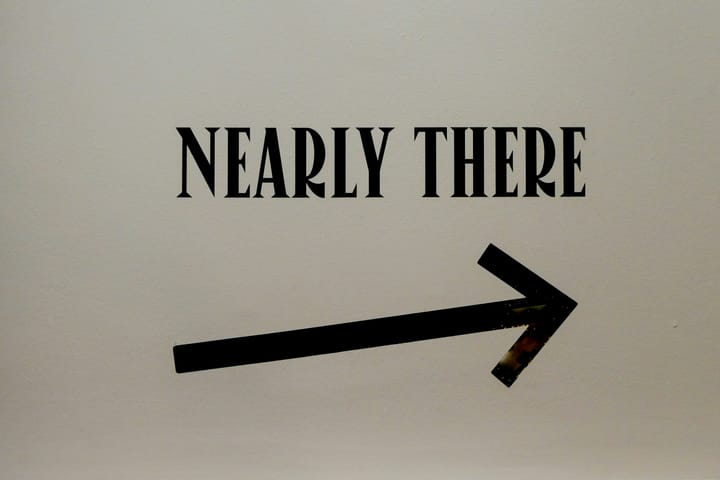True Time Management is About Deciding What Not To Do
When you say yes to something, you are saying no to an endless list of other things. Are you intentional about what you say no to?

When someone asks you how you are doing, what is your go-to response?
I would bet a significant sum that, for most of you, it is some variation of, “Fine, busy”.
I strongly dislike both those words…but let’s leave “fine” for another day and focus on “busy”.
I have been trying to remove the word busy from my daily vernacular for some time. Using busy to describe my life feels like a copout. It feels almost self-important and paints over my responsibility in making choices about how I spend my time.
Being a highly structured productivity consultant with no children means that I have a particular view of what it means to be busy. I have a level of freedom in the decisions I make that not everyone has. That said, many of us give up a lot of agency in how we spend our time by not being intentional about what we include in our days.
We let things happen to us instead of making choices, where we can, about what we agree to and what we neglect.
Being busy is the gateway to burnout…and you do it to yourself
Being busy is a delicate balance of too many moving puzzle pieces that you try to fit together while constantly adding new ones to the pile. These pieces take up all the space in your life…and take and take and take. Or, more accurately, you give and give and give...until there is no space left. And, suddenly you are burnt out and not sure how you got there!
Being busy, and by extension burning out, is often something you do to yourself through the choices you make. So to me, being too “busy” is often a sign that you:
- Are not good at setting boundaries.
- Are not good at saying no to things that don’t matter to you.
- Don’t know how to prioritize the things that do matter to you.
Being busy is also often an indicator that you are letting fear motivate your decisions. You live your life with FOMO (fear of missing out), feeling if you don’t jam everything in, you might miss something important. The problem is you DO miss things because you are being pulled in too many directions.

True time management is not what you chose to do, but what you choose NOT to do
“The real measure of any time management technique is whether or not it helps you neglect the right things.”
- Oliver Burkeman, Four Thousand Weeks
I love this concept because it’s a different way of prioritizing.
Despite your best efforts to optimize your to-do list will never truly be done. There will always be more work, more chores, and more responsibilities.
We have the same amount of time each day as we always have. The problem has never been that there isn’t enough time, but rather that there are far too many priorities. Burkeman wrote,
“The core challenge of managing our limited time isn’t about how to get everything done—that’s never going to happen—but how to decide most wisely what not to do, and how to feel at peace about not doing it.”
That last part, feeling at peace about not doing something, is the key.
It’s being able to overcome FOMO and instead own your decisions and have JOMO (joy of missing out). Note, I did not come up with that. Yes, it’s a little cheesy, but I like it!)
Burkeman says:
“Every decision to use a portion of time on anything represents the sacrifice of all the other ways in which you could have spent that time, but didn’t—and to willingly make that sacrifice is to take a stand, without reservation, on what matters most to you.”

Clarity about what matters provides clarity about what does not
“Clarity about what matters provides clarity about what does not.”
This comes from Cal Newport’s book, Deepwork (A little dense but also a good book.)
Modern life is chaotic and full of countless distractions. There is a constant pull to do more, be more, and get more done. But it doesn’t matter how efficient you are and how much you get done if you aren’t doing the right things. And the “right things” will vary from person to person.
Another way of thinking about this is, in the words of Amy Krouse Rosenthal, you need to:
“Pay attention to what you pay attention to".
Can you clearly articulate what matters to you and what doesn’t? Do the choices you make reflect that?
Intentional prioritization
Instead of letting life happen to you and being at the mercy of other people’s priorities, you can take control of what you pay attention to and what you gift your time to, through intentional prioritization.
If you look at your to-do list through the frame of what not to do AND can accept that it can’t all be done, the question to ask yourself is:
What on this list can or should go?
For the record, this is not where you decide to sacrifice your own health and self-care. This is not where you choose to cut the things that recharge you or help you be mentally and physically well. Ignoring yourself is just another path to burnout!
In my mind, the shift from thinking about what to do and instead deciding what not to do is a combination of:
1. An evaluation of consequences
When you decide not to do something you have to be ok with the consequences of neglecting it or not doing it at all. This might make you uncomfortable. It will be particularly hard for the people pleasers out there (raises hand) who don’t want to disappoint others. But be you are honest with yourself about the actual results of:
- Saying no
- Saying not now
- Changing your mind on something you already agreed to
Most of the time the world will not end. Nothing particularly bad will happen. Other people will be understanding and not care nearly as much as you think they will.
2. An endorsement of an activity
When you decide to do something instead of something else, it is an endorsement of that thing: You doing it says it is more important than the other things.
This is a simplification when there are responsibilities and chores that are part of everyday life. Things will randomly come up that require your time and attention and take it away from other things. And importance is also relative: there are things that are not that important to you that you still have to do.
However, the lens of thinking about what you prioritize as an endorsement of its importance is still interesting. It might catch you when you are thinking about doing something because you feel obligated or automatically said “yes” to, before thinking about how it will impact your day or week.
When you are asked to do something or given different options, it’s worth asking: Can I say, without reservation, that I endorse this activity over others?

How do to decide what not to do
These are questions to ask yourself when you look at your gigantic todo list and try to figure out what can go (or at least be moved further down the list):
- What are the consequences of NOT doing this?
- Is the thing I planned to do more important than the other things?
- Is this mine to deal with or someone else’s?
- If I deal with it, what am I neglecting?
- If I don’t do it, what does this open space for?
Intentional prioritization requires discipline to resist the urge to dive into whatever fires pop up. You have to stop yourself from being reactive and, instead, take the mental leap to check in with where the activity sits in relative importance.
Steve Jobs said:
“People think focus means saying yes to the thing you’ve got to focus on. But that’s not what it means at all. It means saying no to the hundred other good ideas that there are. You have to pick carefully. I’m actually as proud of the things we haven’t done as the things I have done. Innovation is saying no to 1,000 things.”
- Steve Jobs. Apple Worldwide Developers’ Conference, 1997
There is an opportunity cost to anything you say yes to because it means you have said no to all the other things you COULD have done but didn’t.
We have limited time and no way to get more. We have limited energy and attention each day. There are things that are worth giving your time, energy and attention to and things that aren’t. While we don’t have control over every facet of our days, and sometimes we can’t help the things that come up, we have some control.
Take what control where you can. You don't have to be a passenger in your life but rather take some agency back through intentional prioritization. Decide what isn’t worthy of your time, energy, and attention, and gift them to what is.
Figuring out what to cut and what to keep when everything feels like a priority is hard. Book a free consultation to find out how I can help you.
Share
Ashley Janssen

Productivity consultant, writer, speaker, serial entrepreneur, chaos calmer, introvert, cat-lady. Lover of books, fitness, old fashioned’s, basketball, and video games.
Follow me on
Twitter
or
LinkedIn.
Hire me for
1 on 1 productivity consulting
or
speaking.
Related articles

Debunking The False Promises of Productivity

How to Stay Productive When Things Calm Down


Comments ()